Past presidents
Earlham College was been graced with innovative, dedicated and forward thinking presidents. Learn more about our past presidents below:
- Avis Stewart
- Alan Price
- David Dawson
- Douglas C. Bennett
- Eugene S. Mills
- Richard J. Wood
- Lawrence “Pete” Leland
- Dewitt C. “Bud” Baldwin
- Franklin W. Wallin
- Paul Lacey
- Landrum Bolling
- Thomas E. Jones
- William Cullen Dennis
- David Morton Edwards
- Robert Lincoln Kelly
- Joseph John Mills
- William Penn Pinkham
- Joseph Moore
- Barnabas Coffin Hobbs
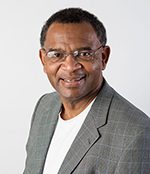
Avis Stewart
2018-2019
Avis Stewart served as interim president from 2018 to 2019.
Avis Stewart served as interim president of Earlham from June 27, 2018, to June 30, 2019.
Avis Stewart served Earlham in a variety of roles for more than three decades. Stewart served as vice president for community relations from 2002 to 2015 and vice president for institutional advancement and community relations from 2015 to 2017. In 2017-18, he served on the President’s Cabinet as a senior adviser to the president and as a major gift officer.
Stewart’s contributions to Earlham and the communities of Richmond and Wayne County have been widely celebrated. In 2014, he received the Sagamore of the Wabash Award, Indiana’s highest accolade for public service. He is also the past recipient of the Townsend Community Center President’s Award, United Way of Whitewater Valley Volunteer of the Year and Wayne County Area Chamber of Commerce’s Appreciation of Service Award.
A native of Marion, Indinana, Stewart came to Earlham in 1970 and was a four-year member of the Earlham basketball team and three-year member of the track team while earning his bachelor’s degree. He was inducted into the Earlham Athletics Hall of Fame in 2001. He also holds a master’s degree from Ball State University.
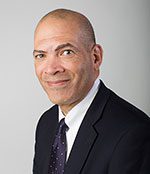
Alan Price
2017-2018
Alan Price served as president from 2017-2018.
Alan Price served as Earlham College’s 18th president from July 1, 2017 to June 27, 2018.
Before coming to Earlham, he was the associate director of management for the Peace Corps and acting chief of staff for the Federal Mediation and Conciliation Service in Washington, D.C. An expert in change management and leadership development, Price served on Earlham’s Board of Trustees from 2016 to 2018.
In the role of president, Price was notable for the enthusiasm and love he expressed for Earlham. Price recruited and hired several new vice presidents, assembling an almost entirely new senior leadership team during his year in office.
Price was the first person of color to serve as Earlham’s president. Although he ran a department at Harvard Business School and has taught on the university level, his career has spanned a broad range of experiences in nonprofit, for-profit and government organizations that informed his return to academia. He majored in economics at Earlham and earned his J.D. at Harvard Law School in 1992.
In a varied career, he has worked as a consultant to major corporations, but also displayed a passion for education, including serving as an elected member of the Cambridge (Mass.) School Board from 2002-04. He also has a long history of public service, serving in the U.S. Army National Guard from 1983-89 and on the Cambridge (Mass.) Police Review and Advisory Board from 1996-2002, in addition to leadership roles in federal government, to which he was appointed by President Barack Obama.
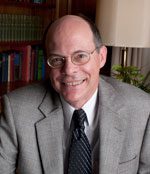
David Dawson
2011-2017
David Dawson served as president from 2011- 2017.
David Dawson served as president and professor of religion at Earlham College from July 1, 2011 to June 30, 2017. Prior to Earlham, Dawson was a member of the faculty and provost at Haverford College in Pennsylvania.
He came to Haverford in 1987 directly from Yale University, where he received his Ph.D. in religious studies in 1988. Prior to this, Dawson received a B.A. from Towson State University, majoring in English and history, and his Master of Divinity degree from the Divinity School of Duke University.
David is the author of two books on ancient biblical interpretation and one book on modern literary theory, as well as a collection of scholarly articles and he enjoys teaching courses in the areas of modern religious thought and comparative literature. His most recent new course is a seminar on the religion of William Blake in word and image, with an emphasis on the interaction of poetry and images in Blake’s illuminated printing.
While serving as provost at Haverford, David worked with other campus leaders on the early development of three new academic centers (the Hurford Humanities Center, the Center for Peace and Global Citizenship, and the Koshland Integrated Natural Sciences Center), initiatives in the area of diversity and social justice, and the development of new programming in the arts.
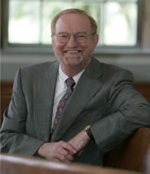
Douglas C. Bennett
1997-2011
Douglas C. Bennett served as president from 1997-2011.
Douglas C. Bennett served as president and professor of politics from 1997 to 2011.
Born in Rochester, New York, Bennett graduated from Haverford College (1968), where he first encountered Quakerism, and earned a Ph.D. in Political Science from Yale University. After eighteen years (1973-1989) teaching political philosophy and public policy at Temple University, Bennett moved to Reed College as Provost. From 1994 to 1997 he was Vice President and chief operating officer of the American Council of Learned Societies in New York City.
He appeared in more Air Guitar performances at Earlham than all of his predecessors combined.
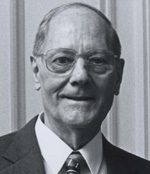
Eugene S. Mills
1996-1997
Eugene S. Mills served as interim president from 1996-1997.
Eugene S. Mills served as interim president of Earlham from 1996 to 1997.
Mills graduated from Earlham in 1948 and received his Ph.D. in psychology from Claremont Graduate Schools. He began his career as an assistant professor of psychology at Whittier College. In 1962 he joined the faculty of the University of New Hampshire, where for 17 years he served as professor, then academic dean, then provost, and finally as president. In 1979 Mills returned to Whittier to serve as its president. He retired from Whittier in 1989 to become an author, writing The Story of Elderhostel (University Press of New England, 1993), an educational program aimed at senior citizens founded at University of New Hampshire in 1975.
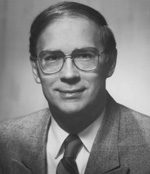
Richard J. Wood
1985-1996
Richard J. Wood was president from 1985-1996.
Richard J. Wood was Earlham’s president from 1985 to 1996.
Wood completed his undergraduate studies at Duke University; completed his M.Div. at Union Theological Seminary; and his Ph.D. from Yale University. An expert in Japanese philosophical thought, ethics and aesthetics, Wood had been a member of Earlham’s philosophy faculty from 1966-80. In 1980 he left Earlham to become vice president of academic affairs at Whittier College, where he became a Quaker.
During his tenure as president of Earlham, Wood became a recorded minister. Although there were a number of controversies during Wood’s tenure, Earlham received a great deal of positive national publicity. He was committed to preserving Earlham’s Quaker identity and improving ties with Quaker constituencies. In 1987, he helped lead a successful capital campaign.
After his resignation in 1996, Wood became the Dean of the Yale University Divinity School. Five years later he became president of the United Board for Christian Higher Education in Asia (2001-06). He was named, through presidential appointment, chair of the U.S.-Japan Friendship Commission of the United States (1994-2002) and also was chair of the U.S.-Japan Cultural and Educational Conference.
He was president of The Japan Society of New York (2006-2009) and took the Society through its 100 year anniversary celebration. In 2010, the government of Japan awarded him The Order of the Rising Sun, Gold and Silver Star, the Japanese equivalent of a knighthood.
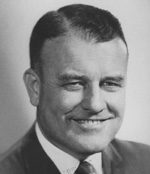
Lawrence “Pete” Leland
1984-1985
Lawrence “Pete” Leland served as acting president in 1984-85.
Lawrence “Pete” Leland served as acting president of the College in 1984-85.
A 1938 Earlham graduate, Leland was a former trustee and insurance executive with National Life Insurance Company of Vermont. An outstanding basketball player, he was an honorary member of the Indiana Basketball Hall of Fame. Leland focused on raising money during his year as acting president and prepared for the hiring of the next president.
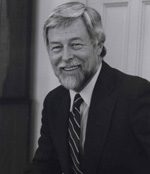
Dewitt C. “Bud” Baldwin
1983-1984
Dewitt C. “Bud” Baldwin served as president in 1983-84.
Dewitt C. “Bud” Baldwin served as president in 1983-84.
A Swarthmore graduate and convinced Friend, Baldwin previously was an associate dean at the School of Medical Sciences of the University of Nevada. He came to Earlham from a successful medical career, having held positions at the Forsyth Dental Center in Boston, the Harvard School of Public Health and the American Medical Association. Baldwin was considered very congenial and popular with students. The Accreditation Council for Graduate Medical Education awarded him its 2009 Gienapp Award for distinguished lifetime achievement.
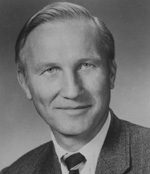
Franklin W. Wallin
1974-1983
Franklin W. Wallin served as president from 1974-1983.
Franklin W. Wallin served as president at Earlham from 1974 to 1983.
Wallin attended the University of Wisconsin as an undergraduate and received his doctorate from Berkeley, specializing in French history. Prior to Earlham he served as dean, provost and acting president at Colgate University, and also had taught at Wayne State University. He was a convinced Friend and served on the board of the Detroit Friends School while teaching at Wayne State. Wallin also was president of the Institute for World Order, now known as the World Policy Institute, for a year before accepting the position at Earlham. Well respected by Earlham administrators, he devoted much effort to financial issues and led Earlham through some challenging years.
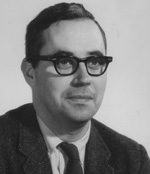
Paul Lacey
1973-1974
Paul Lacey was acting president in 1973-74
Paul Lacey was Earlham’s acting president in 1973-74 and provost for three years.
A Philadelphia native, Lacey earned a B.A. from the University of Pennsylvania and was awarded a Ph.D. by Harvard University. He taught in the English Department at Earlham from 1960-2003 and was Professor Emeritus of English.
Well-known on an international level, Lacey shared his wisdom through extensive writing and speaking. He was involved with the American Friends Service Committee since 1954, having served on the Conscientious Objectors Services and Rights of Conscience Committee, the Standing Nominating Committee, the AFSC Nobel Peace Prize Nominating Committee and the AFSC National Board of Directors.
He served as Clerk of the Board of Directors and Clerk of the Corporation for the AFSC from 2001 to 2010.
Listen to a December 2006 NPR interview with Lacey on “The Prospects of Peace on Earth.”
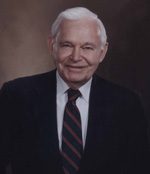
Landrum Bolling
1958-1973
Landrum Bolling served as president from 1958-1973.
Landrum Bolling served as Earlham’s president from 1958 to 1973.
Bolling broke the mold of presidents in some ways; for one, he did not have a Ph.D. He grew up in Tennessee and earned a master’s degree in political science from the University of Chicago. Bolling taught at Beloit College and Brown University and was a war correspondent prior to arriving at Earlham.
During his tenure at the Quaker college, Earlham became nationally known, gained a Phi Beta Kappa chapter and hired its first African-American faculty member, William Cousins. Bolling carefully cultivated donors, gaining a Kresge Foundation grant and several gifts from Indianapolis philanthropist Eli Lilly. Off-campus and international programs blossomed under his leadership. Facilities added to the campus during Bolling’s administration include Lilly Library, Hoerner Residence Hall, Runyan Center, and Noyes and Stanley halls.
After resigning from the presidency, Bolling was named a Honorary Lifetime Trustee of Earlham. He continued his active involvement in global peace and justice issues and serves as a senior advisor to Mercy Corps, an international humanitarian agency. As a tribute to Bolling’s leadership, Earlham named its new social sciences building, the Landrum Bolling Center for Interdisciplinary Studies and Social Sciences, for him in 2002. Later Bolling received the 2005 James L. Fisher Award for Distinguished Service to Education by the Council for Advancement and Support of Education.
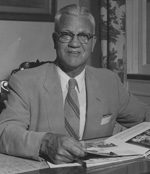
Thomas E. Jones
1946-1958
Thomas E. Jones served as president from 1946-1958.
Thomas E. Jones served as Earlham’s president from 1946 to 1958.
He grew up in Fairmount, Indiana, attended Fairmount Academy, graduated from Earlham and received a Ph.D. in sociology from Columbia. A recorded Quaker minister, he worked as executive secretary of the Young Friends movement. He had lived in Japan while his wife, Esther, served as a missionary.
Jones was serving as president of Fisk University when asked to become Earlham’s next president. Under Jones’s leadership enrollment rose from 225 to almost 1000, $10 million dollars was raised for campus improvements, and the faculty was transformed. Jones developed the “Earlham Idea,” a vision for Earlham’s present and future. Jones engaged in fundraising not only for buildings, but for higher salaries for faculty as well.
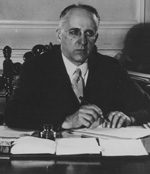
William Cullen Dennis
1929-1946
William Cullen Dennis served as president from 1929-1946.
William Cullen Dennis served as president from 1929 to 1946.
Dennis was the son of beloved biology professor David W. Dennis. He graduated from Earlham and earned two degrees from Harvard. Dennis, an authority on international law, was practicing in Washington, D.C. when asked to become Earlham’s next president. In contrast to previous presidents, Dennis had never taught at a Quaker institution, and was the first Earlham president who was not a recorded Quaker minister.
Dennis shepherded Earlham through the turbulent times of the Great Depression and World War II, defending Japanese-American students from local hostility.
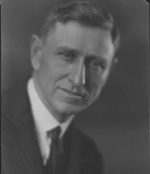
David Morton Edwards
1917-1929
David Morton Edwards served as president from 1917-1929.
David Morton Edwards served as president from 1917 to 1929.
Edwards was born in Earlham, Iowa, and was the first president since the founding of the College who was not an alumnus. He graduated instead from Penn College in 1896, followed by graduate work at the University of Chicago and Boston University. He was the first president with an earned doctorate. Prior to coming to Earlham, Edwards was the president of Penn College. He came from an old Quaker family and was, like past presidents, a recorded minister.
Edwards was president during the “heresy trial” of 1920-21, in which some Friends decried modernist teaching on campus. Following the controversy, Earlham continued squarely down the path of liberal Quakerism. Edwards encouraged Clarence Cunningham, Earlham’s first black graduate, to enroll. Edwards also brought black speakers to campus and signed a public declaration against the Ku Klux Klan in 1924.
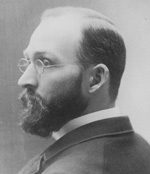
Robert Lincoln Kelly
1903-1917
Robert Lincoln Kelly served as president from 1903-1917.
Robert Lincoln Kelly served as president from 1903 to 1917.
Kelly was educated at Bloomingdale Academy in Parke County, Indiana, graduated from Earlham in 1887, and was a recorded minister. Kelly studied for 3 years at the University of Chicago where he was a student of John Dewey and focused on child psychology. Kelly was a progressive leader for Earlham while working within the Quaker tradition. Entrance requirements were tightened and Kelly sought faculty development by encouraging professors to pursue doctorates.
During Kelly’s tenure, a new library was built in 1907 that was praised as the “most perfect” in the state. Fundraising became very important during Kelly’s time. Continuing the theme of development, Kelly initiated Earlham into the professional associations that emerged during the Progressive Era. Earlham was a charter member of the North Central Association of Colleges and Secondary Schools in 1915. Kelly also helped found the Association of American Colleges, and was active in the National Education Association. He also helped form a group of Quaker presidents within the Five Years Meeting.
Following his resignation in 1917, Kelly served as executive secretary of the Council of Church Boards of Education, and later as executive secretary of the American Association of Colleges.
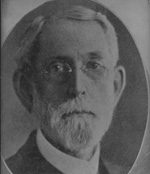
Joseph John Mills
1884-1903
Joseph John Mills served as president from 1884-1903.
Joseph John Mills served as president from 1884 to 1903. Mills studied at the University of Michigan and Earlham, and previously served as principal at the Beech Grove Meeting school in Valley Mills, Indiana.
Although he never finished his college education, he was highly respected as a school administrator. He also served at schools in Wabash Ind., and as Assistant Superintendent of Indianapolis schools. He was a recorded minister of the Society of Friends and a leader in Western Yearly Meeting. During his tenure, the college constructed its first classroom and administrative buildings, Lindley and Parry Halls.
Mills served as president for nineteen years, presently the longest tenure of any president at the College.
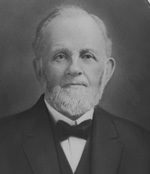
William Penn Pinkham
1883-1884
William Penn Pinkham served as acting president in 1883-84.
William Penn Pinkham, a native of Maine, served as acting president in 1883-84.
Pinkham had taught English at Earlham since 1879. He varied his teaching and administration career in other Quaker institutions with service as a Quaker pastor for years following his one-year presidency.
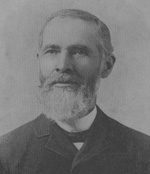
Joseph Moore
1868-1883
Joseph Moore served as president from 1868- 1883.
Joseph Moore was born in Washington County, Indiana, the son of John Parker Moore and Martha Cadwalader. In his early years, Moore attended Friends School and continued his education at the Blue River Academy. When he graduated at age 18, Moore began his teaching career. Three years later, Joseph left Blue River and entered Friends Boarding School. At age 27, Moore enrolled at Harvard to finish his education in science, earning a bachelor’s degree.
In 1861, Moore left Harvard and returned to Earlham. In his science courses, he began to teach evolution, probably one of the first teachers in the Midwest to do so. He became president in 1868 and served until 1883. Moore not only served as president; he founded and expanded the Joseph Moore Museum, the natural history museum that remains an important part of Earlham’s campus. Moore also was recorded a Friends minister in 1865 and was a leader in helping North Carolina Quakers recover after the Civil War.
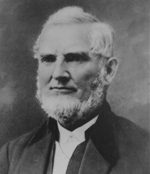
Barnabas Coffin Hobbs
1867-1868
Barnabas served as Earlham’s first president from 1867-1868.
Barnabas Coffin Hobbs, Earlham’s first president, was appointed in 1867. Hobbs previously served as superintendent at the boarding school.
Hobbs grew up in the Blue River Quaker community in Washington County, and graduated from Blue River Academy. In 1837, Hobbs entered Cincinnati College. He also taught at Blue River and at Friends Boarding School in Mount Pleasant, Ohio.
Hobbs was a recorded minister, weighty Friend and the first clerk of Western Yearly Meeting. Hobbs served as president through 1868, leaving to become Indiana’s superintendent of public instruction. He was later appointed a trustee of the College.